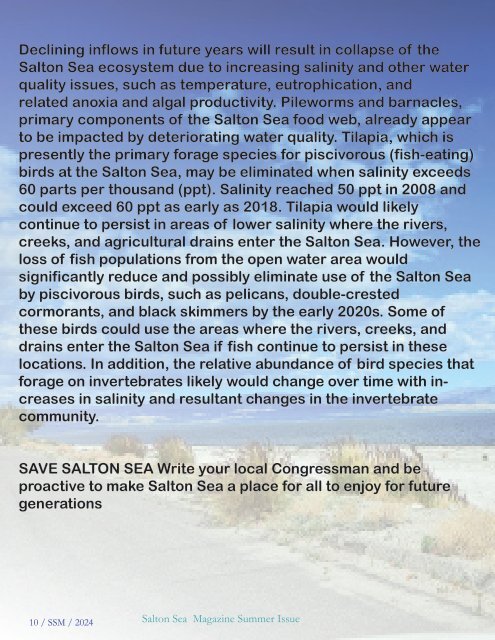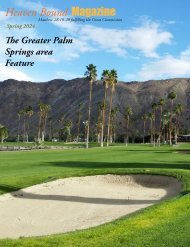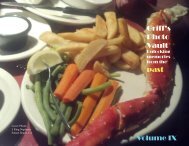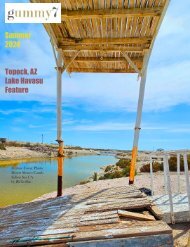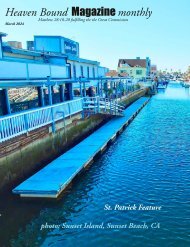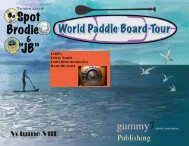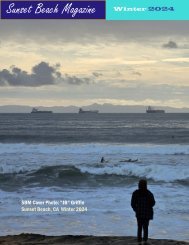Salton Sea Magazine Premier Issue Spring 2024
Welcome to the premier issue of Salton Sea Magazine Featuring Fun Events, People, Places, Ideas, Real Estate, Restaurants, Cool Places to Visit Golf, Updates to Salton Sea History, Preservation Efforts, Lithium Mining & More published by www.jbgmg.com Indio, CA 562.677.7452 email: jbgriffin@jbgmg.com
Welcome to the premier issue of Salton Sea Magazine
Featuring
Fun Events, People, Places, Ideas, Real Estate, Restaurants, Cool Places to Visit
Golf, Updates to Salton Sea History, Preservation Efforts, Lithium Mining
& More
published by
www.jbgmg.com
Indio, CA
562.677.7452
email: jbgriffin@jbgmg.com
You also want an ePaper? Increase the reach of your titles
YUMPU automatically turns print PDFs into web optimized ePapers that Google loves.
Declining inflows in future years will result in collapse of the<br />
<strong>Salton</strong> <strong>Sea</strong> ecosystem due to increasing salinity and other water<br />
quality issues, such as temperature, eutrophication, and<br />
related anoxia and algal productivity. Pileworms and barnacles,<br />
primary components of the <strong>Salton</strong> <strong>Sea</strong> food web, already appear<br />
to be impacted by deteriorating water quality. Tilapia, which is<br />
presently the primary forage species for piscivorous (fish-eating)<br />
birds at the <strong>Salton</strong> <strong>Sea</strong>, may be eliminated when salinity exceeds<br />
60 parts per thousand (ppt). Salinity reached 50 ppt in 2008 and<br />
could exceed 60 ppt as early as 2018. Tilapia would likely<br />
continue to persist in areas of lower salinity where the rivers,<br />
creeks, and agricultural drains enter the <strong>Salton</strong> <strong>Sea</strong>. However, the<br />
loss of fish populations from the open water area would<br />
significantly reduce and possibly eliminate use of the <strong>Salton</strong> <strong>Sea</strong><br />
by piscivorous birds, such as pelicans, double-crested<br />
cormorants, and black skimmers by the early 2020s. Some of<br />
these birds could use the areas where the rivers, creeks, and<br />
drains enter the <strong>Salton</strong> <strong>Sea</strong> if fish continue to persist in these<br />
locations. In addition, the relative abundance of bird species that<br />
forage on invertebrates likely would change over time with increases<br />
in salinity and resultant changes in the invertebrate<br />
community.<br />
SAVE SALTON SEA Write your local Congressman and be<br />
proactive to make <strong>Salton</strong> <strong>Sea</strong> a place for all to enjoy for future<br />
generations<br />
10 / SBM / 2023 <strong>Salton</strong> <strong>Sea</strong> <strong>Magazine</strong> <strong>Spring</strong> <strong>Issue</strong>


